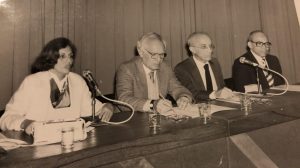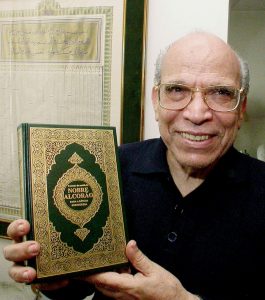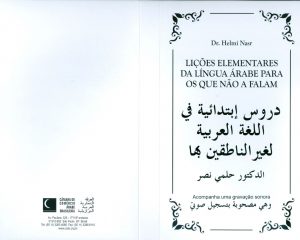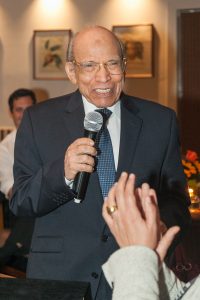São Paulo – Retired University of São Paulo (USP) professor and former Arab Brazilian Chamber of Commerce International Relations vice president Helmi Mohammed Ibrahim Nasr passed away last Sunday (24) in Cairo, Egypt. He was 97 and died of natural causes. The news was confirmed by the professor’s son, the cardiologist Mohamed Nasr, who lives in the Egyptian capital.
Helmi Nasr was born in Mansoura, in the Nile Delta area, some 130 km north of Cairo, on March 22, 1922. He attended Cairo’s Al Azhar school, where he initiated his studies in Arabic language and the Koran. He went on to study Arabic Literature at Cairo University.
In 1952, Nasr moved into Paris, France, where he studied French Literature and Translation at Sorbonne University. His postgraduate studies also included Psychology and Sociology. Back in Cairo, he taught at the Ain Shams University’s Faculty of Languages.

A pioneer in the teaching of Arabic by Brazilian universities, Nasr arrived in the country in 1962 to teach at the USP’s Faculty of Philosophy, Languages and Sciences (FFLCH). He’d come to spend a year. He spent 53 instead.
The scholar left behind an enduring legacy of works, from educational and academic publications to translations, the best known of which is a bilingual Arabic-Portuguese version of the Koran, the holy book of Islam, released in 2005 by the King Fahd Complex in Medina, Saudi Arabia, and distributed in Brazil by the Arab Brazilian Chamber.
Around the time the translation of the Koran came out, the professor said he hoped his work would help build bridges between peoples. “The Koran is an interesting, pleasant reading. I invite everyone to engage in this pleasant, enriching read,” he said during the launch event in Brasília. “Not so that everyone will become a Muslim, but so that people will become aware of the existence of a religion that can be helpful in their lives,” Nasr argued. “Who knows, maybe in the future (the Koran) will be more widely studied here (in Brazil),” he said.

Earlier that year had seen Nasr release an Arabic-Portuguese Dictionary, on occasion of the first Summit of South America-Arab Countries (ASPA), in Brasília. “Our [Arab] colony is massive, and many people will need it. This is very important to the whole Arab-Brazilian community,” he said then.
His work to spread Islam in Brazil led to an invitation to sit on the board of the International Meeting of Muslim Scholars and Thinkers, held in 2007 by the Mecca, Saudi Arabia-based Muslim World League.
In the late 1970s, the professor issued the guide Lições elementares da língua árabe para os que não a falam (Basic lessons in Arabic for non-speakers), which came with cassette tapes containing lessons in Arabic, in his own voice, and in Portuguese, in the voice of Cid Moreira, then the presenter of TV Globo newscast Jornal Nacional. The book was reissued in 2008, this time in a CD version. “The book is intended for everyday situations. Travelers, for instance, will learn to engage in conversation, to greet someone, to buy or sell something,” he said on the occasion.
Nasr translated Pernambuco sociologist Gilberto Freyre’s Novo mundo nos trópicos (New World in the Tropics) from Portuguese into Arabic, thereby relaying some of the formative history of Brazilian society to the Arab public.
The professor was also a great champion of Arab and Muslim culture outside of academia. In the 1970s, he joined the Arab Chamber as a member of a committee tasked with raising funds to build the Syrian-Lebanese Hospital.

He never moved away, having sat on the board through several administrations. In 1992, Nasr was a driving force in the Arab Chamber’s recognition by the Union of Arab Chambers and the League of Arab States – which it still retains.
Nasr became a naturalized Brazilian citizen and married Nida Gattaz, a professor of Spanish at USP. She passed in 2008. In 2015, the professor chose to withdraw from the public eye and moved back to Cairo to be closer to his family. “I feel lonely”, he confided to ANBA at the time. “I’ve completed my mission. I’ll live my last days at peace,” he said.
Helmi Nasr was beloved and revered by the Arab and Muslim communities in Brazil, and especially São Paulo, as well as in academia. Infectiously congenial, the professor had an unwavering broad smile and was always ready to tell or hear a long story.
Reactions
“Professor Nasr is irreplaceable. It was a privilege to have made his acquaintance, just as it was a privilege for the Chamber to have him on its board for much of its history,” said Arab Chamber president Rubens Hannun, a fellow board member of Nasr’s for several years.
“A friend, a companion, a professional, a humane person. I personally learned a lot from him many times, and I seek inspiration in his wisdom whenever I need to be daring and considerate at once. He’s sorely missed,” said Hannun.

A Cardiac Surgery professor at Cairo’s National Heart Institute, Mohamed Nasr pointed out that his father was a proponent of Cartesianism who used to say there’s no contradiction between Cartesian philosophy and being religious and tolerant of others’ ideas. “If one’s neither Cartesian nor tolerant of others’ ideas, one cannot make progress or develop modern society, is what he used to say,” Mohamed told ANBA via messaging. “May God have mercy on his soul and may he rest in peace,” he said.
The dean of the Council of Arab Ambassadors in Brazil, Ibrahim Alzeben also lamented the professor’s death. “On behalf of the Council of Arab Ambassadors I would like to extend our deepest condolences and grief over the loss of an Arab flag-bearer whose presence was felt in Brazil in academic, social and religious circles and as vice president of the Arab Brazilian Chamber of Commerce,” said Alzeben, who’s also ambassador of Palestine.
The diplomat reminisced on the professor’s warm personality. “I knew professor Nasr, may he rest in peace. I remember he was always smiling, optimistic and ready to serve the community. We pray for his soul and extend our condolences to his family and friends, because he had many true friends who embraced him as part of their families,” he said.
Alzeben went on: “On behalf of the Council, we extend our condolences to the Chamber of Commerce board, because in losing professor Nasr, we lose those founding fathers of the work for Brazilian-Arab [relations], someone who rendered great services and did great work that will be remembered through the generations, when he managed to translate the Koran into Portuguese, a feat worthy of much respect and admiration.”
Besides his son, the professor is survived by two granddaughters, five great-grandchildren, a brother and nephews.
Translated by Gabriel Pomerancblum




